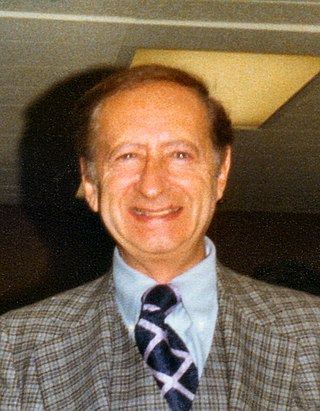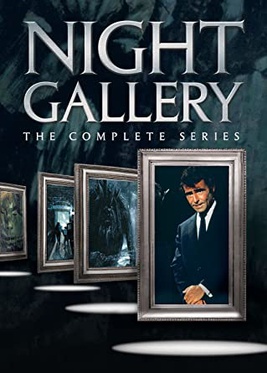
Robert Albert Bloch was an American fiction writer, primarily of crime, psychological horror and fantasy, much of which has been dramatized for radio, cinema and television. He also wrote a relatively small amount of science fiction. His writing career lasted 60 years, including more than 30 years in television and film. He began his professional writing career immediately after graduation from high school, aged 17. Best known as the writer of Psycho (1959), the basis for the film of the same name by Alfred Hitchcock, Bloch wrote hundreds of short stories and over 30 novels. He was a protégé of H. P. Lovecraft, who was the first to seriously encourage his talent. However, while he started emulating Lovecraft and his brand of cosmic horror, he later specialized in crime and horror stories working with a more psychological approach.

Night Gallery is an American anthology television series that aired on NBC from December 16, 1970, to May 27, 1973, featuring stories of horror and the macabre. Rod Serling, who had gained fame from an earlier series, The Twilight Zone, served both as the on-air host of Night Gallery and as a major contributor of scripts, although he did not have the same control of content and tone as he had on The Twilight Zone. Serling viewed Night Gallery as a logical extension of The Twilight Zone, but while both series shared an interest in thought-provoking dark fantasy, more of Zone's offerings were science fiction while Night Gallery focused on horrors of the supernatural.
The year 1962 involved some significant events in television. Below is a list of notable events of that year.

Alfred Hitchcock Presents is an American television anthology series created, hosted and produced by Alfred Hitchcock, airing on CBS and NBC, alternately, between 1955 and 1965. It features dramas, thrillers, and mysteries. Between 1962 and 1965, it was renamed The Alfred Hitchcock Hour. Hitchcock himself directed only 18 episodes during its run.

Andre Brandon deWilde was an American theater, film, and television actor. Born into a theatrical family in Brooklyn, he debuted on Broadway at the age of seven and became a national phenomenon by the time he completed his 492 performances for The Member of the Wedding. He won a Donaldson Award for his performance, becoming the youngest actor to win one, and starred in the subsequent film adaptation for which he won a Golden Globe Award.

"The Sorcerer's Apprentice" is a poem by Johann Wolfgang von Goethe written in 1797. The poem is a ballad in 14 stanzas.

Joseph William Stefano was an American screenwriter, known for adapting Robert Bloch's novel as the script for Alfred Hitchcock's film Psycho, and for being the producer and co-writer of the original The Outer Limits television series.
"Autopsy Room Four" is a short story by American writer Stephen King. It was first published in King's limited-edition collection Six Stories in 1997 and appeared in the anthology Robert Bloch's Psychos later the same year. In 2002, it was collected in King's collection Everything's Eventual. It was adapted into a short film in 2003. It was also part of TNT's Nightmares & Dreamscapes: From the Stories of Stephen King series in the summer of 2006.

Alcoa Presents: One Step Beyond is an American anthology series created by Merwin Gerard. The original series was broadcast for three seasons by the American Broadcasting Company (ABC) from January 1959 to July 1961.

Robert E. Bray was an American film and television actor known for playing the forest ranger Corey Stuart in the CBS series Lassie, He also starred in Stagecoach West and as Mike Hammer in the movie version of Mickey Spillane's novel My Gun Is Quick (1957).

Henry Slesar was an American author and playwright. He is famous for his use of irony and twist endings. After reading Slesar's "M Is for the Many" in Ellery Queen's Mystery Magazine, Alfred Hitchcock bought it for adaptation and they began many successful collaborations. Slesar wrote hundreds of scripts for television series and soap operas, leading TV Guide to call him "the writer with the largest audience in America."

Journey to the Unknown is a British anthology television series, produced by Hammer Film Productions and 20th Century Fox Television. It aired on ABC from September 26, 1968, to January 30, 1969. The series first aired in the UK on the ITV network on 16 November 1968.

Ruby Neilam Salvador Adams, known professionally as Neile Adams, is a Filipina American actress, singer, and dancer who made more than 20 appearances in films and television series from 1952 to 1991.

NBC Sunday Showcase was a series of hour-long specials telecast in color on NBC during the 1959–60 season. The flexible anthology format varied weekly from comedies and science fiction to musicals and historical dramas. The recent introduction of videotape made repeats possible, and two 1959 dramas had repeats in 1960.

David J. Stewart was an American Broadway, film, and television actor.
Sorcerer's Apprentice may refer to:

Francis Michael Dunne was an American actor, radio personality and disc jockey. He was active in television and films from 1945 to 1973, and was also credited as Steve Dunn, Michael Dunne, Stephan Dunne, and Steve Dunne.

Suspicion is the title of an American television mystery drama series which aired on the NBC from 1957 through 1958. The executive producer of half of the filmed episodes (10) of Suspicion was film director Alfred Hitchcock.
James P. Cavanagh was an American television writer. He wrote numerous episodes for Alfred Hitchcock Presents and won a Primetime Emmy in 1957 for his teleplay Fog Closing In. Cavanagh wrote the first script for the 1960 film Psycho. Though the script was rejected by Hitchcock it contained many similarities with the final version, written by Joseph Stefano.
Alfred Hitchcock Presents aired 39 episodes during its seventh season from 1961 to 1962. One episode, The Sorcerer's Apprentice, was not aired in its network run.















